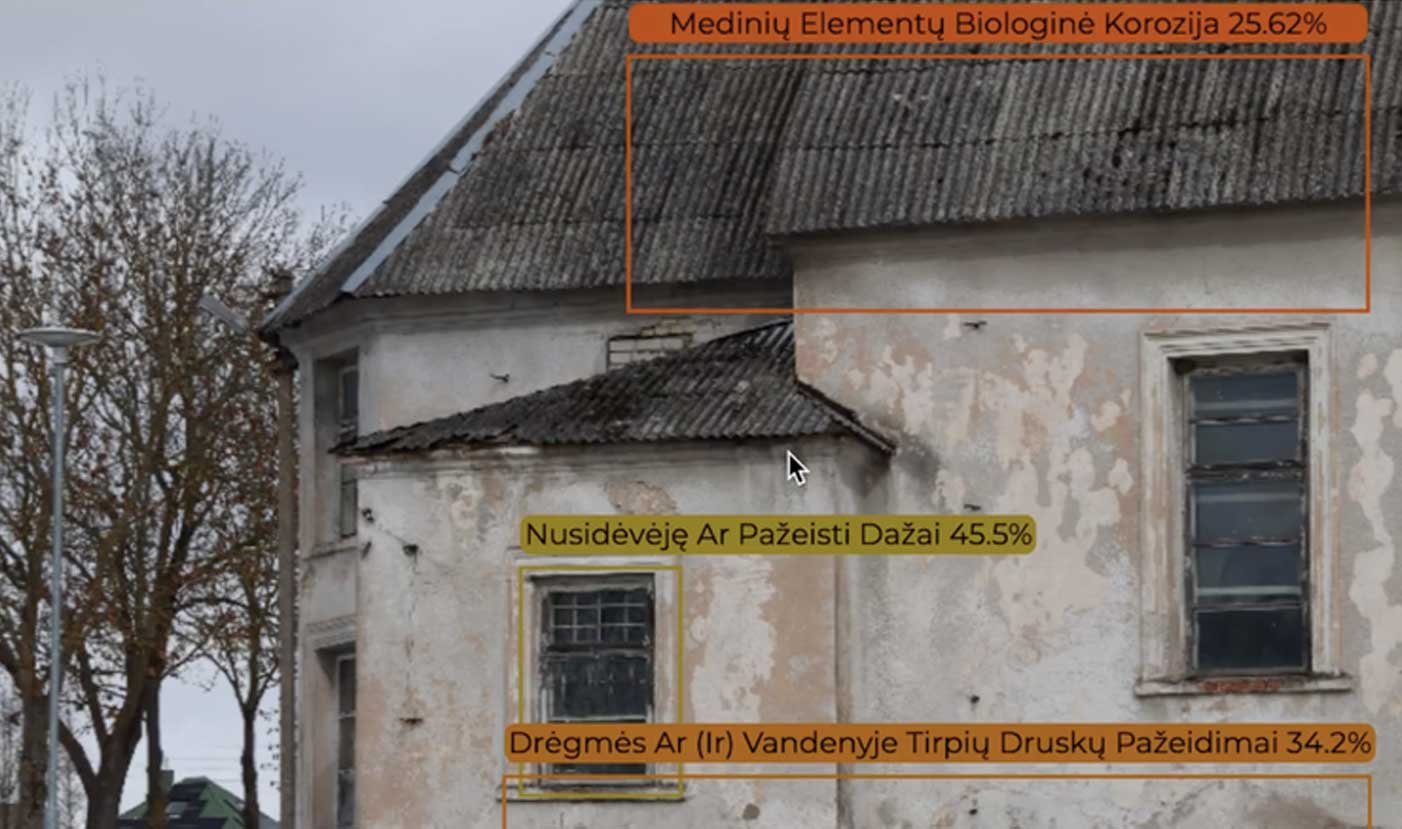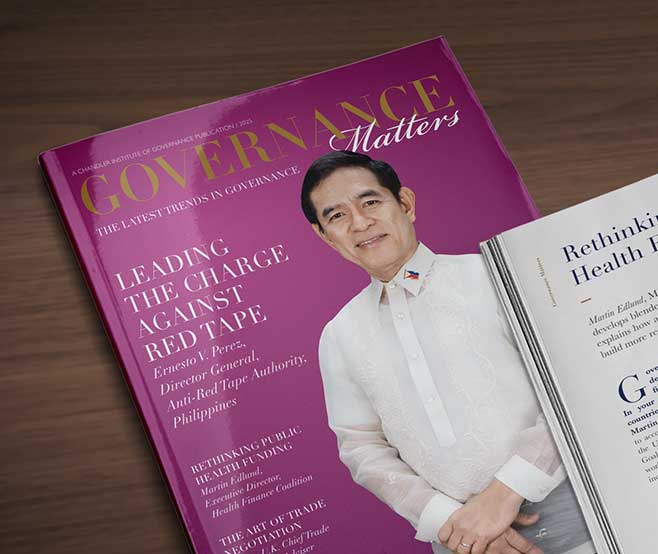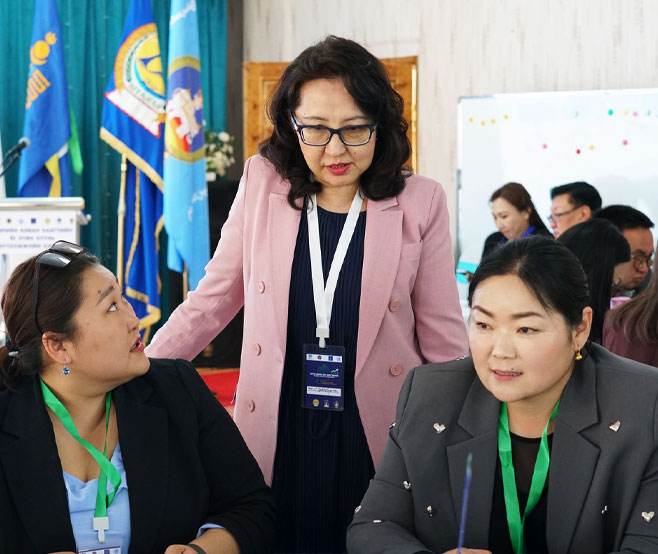Brazil’s First Minister of Indigenous Peoples
As the head of a newly created ministry, Sônia Guajajara faces no small task: to protect Indigenous lands, cultures, and communities. She discusses her work to transform political vision into concrete achievements.
Lorem ipsum dolor sit amet, consectetur adipiscing elit, sed do eiusmod tempor incididunt ut labore et dolore magna aliqua. Ut enim ad minim veniam, quis nostrud exercitation ullamco laboris nisi ut aliquip ex ea commodo consequat. Duis aute irure dolor in reprehenderit in voluptate velit esse cillum dolore eu fugiat nulla pariatur.
Heading 1
Heading 2
Heading 3
Heading 4
Heading 5
Heading 6
Lorem ipsum dolor sit amet, consectetur adipiscing elit, sed do eiusmod tempor incididunt ut labore et dolore magna aliqua. Ut enim ad minim veniam, quis nostrud exercitation ullamco laboris nisi ut aliquip ex ea commodo consequat. Duis aute irure dolor in reprehenderit in voluptate velit esse cillum dolore eu fugiat nulla pariatur.
Block quote
Heading 6
Ordered list
- Item 1
- Item 2
- Item 3
Unordered list
- Item A
- Item B
- Item C
Bold text
Emphasis
Superscript
Subscript
A Need to Protect Brazil’s Indigenous Communities and Natural Environment
Attacks on Brazil’s Indigenous peoples and invasions of their lands by illegal miners and loggers had been increasing dramatically in recent years. Under the previous political administration, the rights of Indigenous peoples had been systematically dismantled, and violence and exploitation was even encouraged. However the 2022 Presidential campaign of Luiz Inácio Lula da Silva (now President) signalled a change. During that campaign, he met with and promised the Indigenous peoples a new ministry to address and meet their needs.
The establishment of the new Ministry in 2023 reflects the current government’s recognition of the importance of Indigenous peoples and their concerns. Indigenous communities are fundamental to the country’s cultural diversity. There is also clear evidence that Indigenous peoples have an essential role in protecting the environment and biodiversity.
The relationship between Brazil’s Indigenous peoples and environmental conservation is a close and deeply intertwined one. Indigenous territories play a crucial role in preserving the Amazon rainforest. These lands are often some of the best-preserved areas of the Amazon, with lower deforestation rates and higher biodiversity compared to other regions. Indigenous lands also contain about 50% more carbon per hectare than unprotected areas. By maintaining forest cover, these lands play a significant role in carbon sequestration, which is vital for climate change mitigation and global climate stability.1
Indigenous territories account for only 5% of net forest loss in the Brazilian Amazon, despite encompassing over half of the region’s forested area: a testament to the effectiveness of their land management practices in conserving forest cover and preventing deforestation.2 Indigenous territories act as barriers against land speculation and deforestation.

Ensuring Representation and Participation
Beyond the preservation of Brazil’s cultural and natural heritage, there is also a clear need for wider participation and representation from Indigenous groups to strengthen Brazil’s democratic process and deliver more effective public policies that meet everyone’s needs.
Once in office, President Lula revived the National Council for Indigenous Policy (CNPI), a key participatory body between Indigenous peoples and the government. The CNPI, a joint consultative group with 30 Indigenous representatives and 30 government representatives, is responsible for preparing and monitoring the implementation of public policies aimed at Indigenous peoples.
The CNPI’s Indigenous representatives are chosen through a regional mobilisation exercise, called the Participa Parente Caravan, the “participatory caravan”, which travels through each state. These representatives are elected at their regional bases, with representation from each state. The CNPI is Brazil’s primary platform for discussing and reviewing indigenist policy on a wide range of issues.

According to data from the 2022 demographic census, Brazil is home to 266 different Indigenous peoples, who communicate in 275 different languages. Their population numbers 1.7 million, which is just under 1% of Brazil’s total population. More than half of the Indigenous persons in the country live in the nine federal states that make up the Legal Amazon, known locally as Amazônia. It is a vast territory of 502 million hectares, making it larger in area than the European Union (EU). Although Amazônia is mostly known for its vast natural forests, over three-quarters of Amazonians live in towns and cities. Thirty-six percent of Amazônia’s population lives in poverty. Amazônia is home to about 60% of the Amazon rainforest and to parts of other important biomes such as the Cerrado savanna and the Pantanal wetlands.4

Satellite image source: Survival International.6
The Challenge of Safeguarding Indigenous Lands
Indigenous peoples have been forcibly removed from their ancestral lands in Brazil’s past and recent history. As such, an important goal of this government is to demarcate new Indigenous lands in Brazil and help protect lands already identified. These lands must first of all be recognised; their protection must then be regularised. However, there are many stakeholders with different interests who hold great political and economic power in this matter.
Our Ministry’s approach to this challenge is to raise awareness about such issues among different groups, especially Brazil’s legislative body, the National Congress. While President Lula has committed to demarcating more Indigenous lands—for greater environmental protection and to help contain the climate crisis—Congress has not been very supportive in this endeavour.

Despite these hurdles, Brazil has recognised and approved ten new Indigenous lands during my first year in office as Minister—more than had been achieved in the preceding ten years. Now comes the important work of continuous dialogue with the governors of the states where these lands are situated, with the Indigenous communities, and with the groups who currently occupy these Indigenous territories illegally. We are working to resettle families who may currently occupy Indigenous territories so that they are not forcibly removed.
There are also many more territories at the various stages of the demarcation process. We continue to work very closely with FUNAI (the National Foundation of Indigenous Peoples), the Ministry of Justice, and the President’s office at every stage of this process.

Revitalising Indigenous Languages and Cultural Practices
The importance of Indigenous culture is enshrined in Brazil’s constitution, which states that Indigenous peoples “shall have their social organisation, customs, languages, creeds, and traditions recognised” (Article 231). The state officially began collecting data on ethnicity and Indigenous languages spoken in households in the national population census of 2010, and again in 2022 with more geographical breadth and depth. Such information is critical so that we can better understand our Indigenous peoples and know what needs recognising and protecting.
Many Indigenous languages in Brazil remain seriously endangered. With less use, these languages are no longer being transmitted to new generations. As minority Indigenous communities assimilate into the mainstream of Brazilian society, thousands of years of linguistic diversity and Indigenous knowledge risk being lost.
To support linguistic and cultural preservation, the government has implemented a variety of programmes such as linguistic studies, educational projects, and ongoing dialogues with communities. Effective strategies have included the creation of teaching materials in the different languages, writing programmes, mother tongue teaching, and the documentation of traditions. Our Ministry is also working to translate Brazil’s laws and materials about citizens’ rights into Indigenous mother tongues to ensure communities know their rights and responsibilities.
We have also invested in a programme to repatriate Indigenous artefacts and objects previously taken from Brazil to other countries. This has progressed with France, Italy, and Portugal.
The Ministry also works to improve the social and economic conditions of Indigenous communities, including initiatives related to sustainable economic development. In January 2024, Brazil introduced the Indigenous Seal of Brazil, which certifies that a product, whether agricultural, artisanal, or extractive, was cultivated or harvested by an Indigenous individual on their ancestral land. It specifies the ethnicity of the producer, whether they are an individual or a company, and indicates the Indigenous territory where the product was cultivated.

The intention of this certification is to value and identify the cultural heritage of Indigenous peoples. Through this initiative—a collaboration between our Ministry, FUNAI, and the Agrarian Development Ministry—we want to encourage sustainable consumption, while generating income for Indigenous communities and contributing to regional development.
All of these diverse programmes benefit from dedicated coordinators, ongoing research, and institutional partners who are in constant and direct dialogue with Indigenous communities to support their work. But one of our biggest challenges remains a limited budget, which constrains how much we can achieve.
Promoting Inclusion and Participation in the Conversations That Matter
As Minister, I see it as my responsibility to take part in national and international fora in key areas of interest, whether that be the bioeconomy, environmental protection, gender issues, or the inclusion of Indigenous peoples in decision-making spaces. It is increasingly important to occupy political spaces: to participate in how issues are discussed and determine how our voices are represented.
I recently took over the presidency of FILAC, the Fund for the Development of Indigenous Peoples of Latin America and the Caribbean. FILAC works with Indigenous peoples, governments, civil society, academia, and industry to support the self-development processes of Indigenous peoples across 22 countries in the region. These fora enable the exchange of ideas, help build consensus around sustainability and Indigenous peoples’ rights, and improve the visibility of Indigenous peoples’ perspectives.

I urge more government and non-government leaders to promote the inclusion and active participation of Indigenous peoples and marginalised actors in public policymaking, and to ensure that their voices and needs are heard and taken seriously. Respecting the value of cultural diversity and the right for self-determination is the only way to build a more just and sustainable society.
For me, the greatest difficulty is in getting institutions to understand and recognise the importance of Indigenous peoples. Changing established legal structures— so that they uphold the historical and cultural rights of Indigenous peoples, and respect their role in protecting the environment and in maintaining biodiversity—is an uphill task.
That said, I deeply believe that Brazil, through the work of my Ministry and its partners, is going in the right direction: towards strengthening democracy, towards guaranteeing respect for human rights, and towards protecting Indigenous lands.
The climate crisis and the excessive exploitation of our world’s natural resources are global concerns. The worldviews and material practices of Indigenous peoples respect the environment in a way that can better support the continuation of life on our planet. Protecting Indigenous lands is hence vital to the containment of the climate crisis. We are sounding the alarm and making the call for all peoples to support our cause. The responsibility lies with all of us.

Heading 1
Heading 2
Heading 3
Heading 4
Heading 5
Heading 6
Lorem ipsum dolor sit amet, consectetur adipiscing elit, sed do eiusmod tempor incididunt ut labore et dolore magna aliqua. Ut enim ad minim veniam, quis nostrud exercitation ullamco laboris nisi ut aliquip ex ea commodo consequat. Duis aute irure dolor in reprehenderit in voluptate velit esse cillum dolore eu fugiat nulla pariatur.

Block quote
Ordered list
- Item 1
- Item 2
- Item 3
Unordered list
- Item A
- Item B
- Item C
Bold text
Emphasis
Superscript
Subscript
Lorem ipsum dolor sit amet, consectetur adipiscing elit, sed do eiusmod tempor incididunt ut labore et dolore magna aliqua. Ut enim ad minim veniam, quis nostrud exercitation ullamco laboris nisi ut aliquip ex ea commodo consequat. Duis aute irure dolor in reprehenderit in voluptate velit esse cillum dolore eu fugiat nulla pariatur.
Endnotes
- https://revistagalileu.globo.com/Ciencia/Meio-Ambiente/noticia/2021/04/por-que-o-governo-brasileiro-esta-sendo-processado-por-pedalada-climatica.html
- https://www.nature.org/en-us/about-us/where-we-work/latin-america/brazil/stories-in-brazil/indigenous-are-essential-to-forest-conservation/
- https://agenciadenoticias.ibge.gov.br/en/agencia-news/2184-news-agency/news/37575-brazil-has-1-7-million-indigenous-persons-and-more-than-half-of-them-live-in-the-legal-amazon
- https://www.worldbank.org/en/country/brazil/publication/brazil-a-balancing-act-for-amazonian-states-report
- Silva Junior, C.H.L., Heinrich, V.H.A., Freire, A.T.G. et al. Benchmark maps of 33 years of secondary forest age for Brazil. Sci Data 7, 269 (2020). https://doi.org/10.1038/s41597-020-00600-4.
- https://assets.survivalinternational.org/pictures/7649/deforestation-around-brazil-tis_screen.jpg
- Item 1
- Item 2
- Item 3


Born to a Guajajara family of the Indigenous Tentehar people, Sônia Bone de Sousa Silva Santos (and known as Sônia Guajajara) is Brazil’s first Minister of Indigenous Peoples, and the first Indigenous woman to become a Minister in the country. Her Ministry seeks to address and advocate for Indigenous issues more effectively within the federal government. She has worked in several Indigenous organisations, such as the Coordination of Organizations and Articulations of Indigenous Peoples of Maranhão (COAPIMA), the Coordination of Indigenous Organizations of the Brazilian Amazon (COIAB), and was previously executive coordinator of the Articulation of Indigenous Peoples of Brazil (APIB). Internationally recognised for defending the rights of Indigenous peoples, their territories, and socio-environmental causes, she was named one of TIME Magazine’s 100 most influential people in 2022.
Lorem ipsum dolor sit amet, consectetur adipiscing elit, sed do eiusmod tempor incididunt ut labore et dolore magna aliqua. Ut enim ad minim veniam, quis nostrud exercitation ullamco laboris nisi ut aliquip ex ea commodo consequat. Duis aute irure dolor in reprehenderit in voluptate velit esse cillum dolore eu fugiat nulla pariatur.













